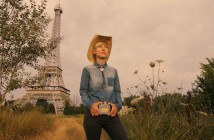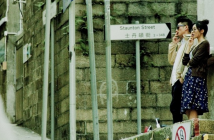
Autobiographical Scene Number 6882 (2005)
Cast: Anette Anderson, Ingela Borgström, Martin Byström
Director: Ruben Östlund
Country: Sweden
Genre: Drama
Websites: TIFF
Editor’s Notes: The following review is part of our coverage for TIFF’s In Case of No Emergency: The Films of Ruben Östlund which runs from April 9th to April 14th. For more information on upcoming TIFF film series visit http://tiff.net and follow TIFF on Twitter at @TIFF_NET.
In Autobiographical Scene Number 6882, Ruben Östlund shows us fragments of a moment when a man tries to impress his friends with an act of stupidity fueled by alcohol and the insecure bravery of youth. We watch a group of friends as one of them prepares to jump off of a bridge to prove his worth amongst the pack, acting on primal impulses as he balances the line between wanting to prove his masculinity and wanting to be talked out of doing something stupid that he doesn’t really want to do. There is nothing to gain by jumping off the bridge except for temporary supremacy within the pack and the satisfaction of a destructive need for validation, but logic and rationality are of little use to the young and intoxicated.
The image occasionally breaks apart in stylistic flashes of formless color and reemerges bleached and contorted as Östlund plays with the medium and amplifies the intensity of the content by manipulating the form.
In typical Ruben Östlund fashion, the camera places us in the role of the uninvolved observer, capturing vast expanses of concrete and slate-grey Scandinavian skies with the only splashes of color coming from the group of friends that occupy a small portion of the frame. Östlund uses distance to remove our ability to join the action, amplifying its futility as we maintain distance from the excitement of the moment. The image occasionally breaks apart in stylistic flashes of formless color and reemerges bleached and contorted as Östlund plays with the medium and amplifies the intensity of the content by manipulating the form. The jump itself becomes decreasingly important as the viewer and the group of friends in the film start to lose interest in the jumper’s egotistical grandstanding.
You only get one shot at youth, so you have to capitalize on all of the wonderful opportunities to be stupid before you become older and driven by boring sensibility. The sound advice of an older man as he warns the group of the possibility of death only amplifies the significance of the moment by validating the risk. It’s now or never for Martin as he balks at the edge of the bridge, weighing risk against reward as a successful jump would bring him dominance within his pack of friends but a minor miscalculation could mean death. Not jumping would be the only real tragedy in this scenario, losing the respect of his peers by not doing something they really didn’t want him to do in the first place in the convoluted ironies that come with being young and superficial. It’s a good thing that cameras weren’t nearly as ubiquitous twenty years ago as they are now, though I’m certain there is plenty of documentation on my own acts of idiotic heroism for the sake of amusing four other people. It’s a wonder that any of us grow old enough to find safer ways to satisfy our need for constant validation and approval.
In typical Ruben Östlund fashion, the camera places us in the role of the uninvolved observer, capturing vast expanses of concrete and slate-grey Scandinavian skies with the only splashes of color coming from the group of friends that occupy a small portion of the frame.



